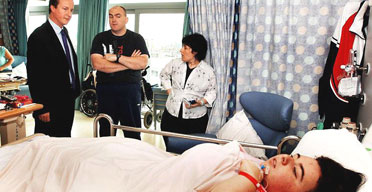
Fresh from his summer vacation in France, David Cameron stepped back into the political ring today to challenge Gordon Brown to a "bare-knuckle fight" over possible hospital closures.
His decision to take on the government over the health service - once seen as a preserve of the Labour party - underlines Mr Cameron's determination to win the argument on the NHS.
With talk of Gordon Brown calling a snap October election to capitalise on his honeymoon period as prime minister, Mr Cameron has some work to do in shifting the Conservative party's image back on to the centre ground.
John Redwood's economic competitiveness review was published last week, prompting claims that the Tories were making a return to a focus on tax cuts and deregulation.
What better way to undermine accusations that the party was lurching back to the right than to defend a universal, tax-funded service? Persuading the voting public that the NHS is safe in Tory hands could be the clincher at the ballot box.
Mr Cameron first signalled this approach at the party's annual conference in Bournemouth last year, when he summed up his political priority in three letters: NHS.
As Labour hit the headlines over deficits, service closures and disgruntled doctors and nurses fed up with constant reorganisation and change, Mr Cameron promised at every opportunity that he would stop telling the workers what to do all the time and that he would get rid of waiting-time targets.
As the father of a disabled son, Mr Cameron said his own family was often in the hands of the NHS so, he argued, his sentiments were personally felt and not just political slogans.
By June, the party had produced its own blueprint for NHS reforms in a Tory white paper, NHS Autonomy and Accountability. The fruits of an 18-month policy review, the document proposed populist measures for patients, such as individual budgets for patients to buy in their services, and promised to back off from telling the workers what to do.
However, the Conservative leader provoked the ire of doctors - traditionally a Tory-voting profession - by suggesting that their pay should be linked to patient satisfaction.
In a nod to Mr Cameron's belief in a plurality of providers in public services - a passion he shares with Tony Blair - the Tory template would allow private hospitals to compete with the NHS on price so long as they could meet certain standards.
It was all going rather well until Mr Blair, the architect of the NHS reforms which have frustrated staff - and at times patients too - stepped down as prime minister.
Cue a fresh new broom, Gordon Brown, who claimed the NHS was his "immediate priority", and a new health secretary, Alan Johnson, who humbly admitted that the government had upset staff with too much reorganisation and too many demands.
Staff received a guarantee of no more reorganisation for the foreseeable future, and a government review to see how to achieve "clinically led, patient-centred" local services.
Mr Cameron and Mr Brown are now head to head in the fight to steal ground on the NHS in the eyes of voters.
Talk of bare-knuckle fights sums up the political stakes as the NHS is set to be a key battleground whenever a general election is called.
As the government fights to push through reforms, the Tory leader can sit back and condemn closures of any kind, regardless of the business case for imposing them.
The party today issued a campaign document in defence of 29 beleaguered district hospitals under threat of losing their accident and emergency departments or maternity units.
The threatened closures, the document claims, are driven by financial concerns and workforce pressures due to the EU working time directive, rather than based on clinical reasons.
Labour, meanwhile, can raise the fact that while Mr Cameron argues about closures, he remains silent on funding.
The battle could get bloody. Thankfully, NHS nurses and doctors treat everyone alike.

